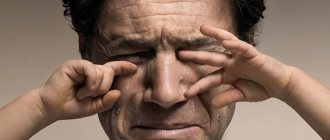Slava Profina 06/20/2018 no comments
0
The number of people susceptible to serious phobias is steadily growing, and even natural processes can cause true fear of them. The crazy rhythm of modern life has forced everyone to think about old age. One of the most common phobias that resonates deeply with many people is gerontophobia.
Why are people afraid of getting old?
This article talks in detail about the fear of old age.
This fear is called gerontophobia. It has two forms. Some people feel horror at the sight of elderly people. Others are terrified of their own old age. This feeling can be explained in different ways. Some are frightened by the prospect of losing their high position in society, power, or losing their jobs. Others panic at the thought of the loneliness and poverty that many face after retirement. In addition, gerontophobes are tormented by fear of illness and helplessness. Fear of old age and infirmity are thus inextricably linked. Finally, with the onset of old age death is associated, which is also frightening. Fear of older people occurs in suspicious individuals prone to hypochondria.
Are boomers to blame again?
Where did the idea of “the best years” come from, which indirectly predetermined the creation of the “27 Club”? Yes, here they tried again, the guys born in 1946–1964, who gave us the cult of uniqueness and the very theory of generations and called themselves “baby boomers.” Having received unlimited opportunities and funds, they so did not want to be like their boring “ancestors” that they simply began to deny aging. There is no more room for traditions and foundations - a new, young generation must rule the world!
The cult of youth developed literally along with youth itself and was built on abstract attributes associated with it: music, beauty, fashion and sexuality.
The media replicated a certain generalized image, making it available throughout the world. Young people in the 1960s-80s (as well as the current generation) listened to the same songs, loved the same idols, followed the same style. All boundaries were erased - baby boomers lived by the principle “We are united because we are young!”
Capitalism guarding the cult of youth
The market economy is mainly focused on the needs of a solvent audience and offers it more and more goods and services that should emphasize the consumer’s belonging to the “elite” age group. The global industries of entertainment, aesthetic medicine (after all, an essential attribute of youth is an ideal body), and pharmacology are developing. For this to work successfully and make a profit, we need more, even more, of those who so willingly consume everything. The boundaries of the “elite” age are expanding, maturity is declared shameful - you must remain forever young at any cost!
And boomers are trying their best. Without changing their habits and position in society, they continue to work on an equal basis with the younger generation and are not going to write themselves off. According to a 2011 survey, 25% of American boomers say they will never retire, and another 42% plan to delay this event as much as possible. On the one hand, the duration of a quality life is constantly growing - so why not live longer without changing anything in your way of life? On the other hand, in this case we are not talking about the fact that at any age a person has a lot of opportunities open to him, but about the fact that 50-60 year olds are supposedly still exactly the same as those who are not even 30. Without wanting to to notice the advantages of maturity, people entering old age literally build a wall of prejudice with their own hands and protect themselves from the “rest of the old people” who do not look as young as others would like, or who like activities “category 60+”.
In fact, growing old, changing your views and habits, is just as normal as growing up.
For some, this period begins earlier, while others “stay young” longer. Someone at 70 years old will go skiing every season, while others will prefer reading or talking with family. Some will retire and forget about work, while others will build a career from scratch. And everyone will be absolutely right.
Old age is just one of the stages of our life, and we need to enter into it without unnecessary fears and stereotypes.
Norm or deviation?
Thoughts about the inevitability of old age visit everyone from time to time.
However, most people feel only mild sadness or short-term anxiety. They treat this phenomenon as a natural process. The fear of old age is due to the inevitability of changes in life and its end. If this sensation does not bother a person too much, it is considered normal. This feeling does not interfere with normal life and does not cause obsessive dark thoughts.
However, in some cases fear is pathological. A person reacts sharply to everything related to aging. For this reason, he avoids any contact with older individuals. The phobia usually develops in people over thirty years of age. During this period, the first manifestations of withering of the body are observed, and it is necessary to form the correct reaction to their occurrence. Fear is rare in old age. Fear of old age and death is not typical for the elderly; they treat this problem calmly.
How to learn not to be afraid of old age
Life can be fulfilling at any age if it is not deliberately distorted. Nobody says that being old is better than being young, but you can get your share of pleasures and experience at any age. You just need to not deny it and correspond to it. Probably everyone has seen young old women dressed up in short skirts and painted like high school girls. They take special pleasure when people with poor eyesight or from behind mistake them for twenty-five-year-olds. But why? After all, upon closer examination, everything will still fall into place, and in the end, instead of admiration, you will only get compassion mixed with disgust.
We must fight old age not by denying it, but by improving it. Firstly, you need to monitor your health. Regular implementation of not at all complicated rules and actions to maintain health will solve at least three quarters of the problems associated with old age. Secondly, old age should not be lonely. Youth spent in pleasure often results in childlessness or poor relationships with children. The family should be taken care of in advance. Thirdly, in old age it is advisable to accumulate some wealth and take the time to understand at least the basics of investing capital. This is not about playing on the stock exchange and getting rich, but just about competent management of capital so as not to lose it. A large and friendly family, age-appropriate normal health and material well-being - what else is needed to meet old age with dignity?
Prerequisites for the development of phobia
The fact that a person’s life ends sooner or later must be approached philosophically. Thinking about this should not cause panic. Until a certain period, children do not think about old age and death. However, later a pathological attitude may develop towards these phenomena. Why is this happening? As a rule, close surroundings and society contribute to the development of fear of old age. A phobia may appear due to the following reasons:
- Personal experience. A serious illness and painful death of a loved one, an elderly person, impresses a child so much that he or she develops an idea of old age as something terrible and painful. The emergence of such thoughts is also facilitated by poor treatment from relatives, lack of support and warmth.
- Traumatic events. This is, for example, the funeral of an elderly loved one to whom the child was strongly attached.
If parents do not find the right words to talk to their child in this situation, he develops a phobia. - Sources of negative information. These include television programs that talk about poor and helpless elderly people who do not have any guarantees or assistance from government agencies.
What do psychologists advise people who are worried about thoughts of death?
If such thoughts are often noted and almost depression occurs after them, then it is better to understand yourself and understand the cause of fear. Most often there are several reasons:
- fear of being left alone and then the inevitability of death will be even more terrible;
- the feeling of guilt that arises when a person is cared for during illness or simply helped. Many people throughout their lives have become accustomed to relying only on themselves. But in old age or with an illness, they can no longer do this. The resulting feeling of guilt drives such a person into even greater depression and the best way out for him is death;
- attracting attention to your person. There are relatives and friends, but they pay practically no attention to such a person. Talking about death often frightens loved ones, forcing them to pay attention and show care;
- the presence of a disease that may soon lead to death.
If a loved one starts talking about death, you should figure out why this is happening and how you can help him. If a person is often haunted by thoughts of death, then there are reasons for this.
Having understood yourself, you can extend your life, make it not just a time on this Earth, but bright and joyful until the very end. But the inevitability of death cannot be prevented and this must be understood and tried to be accepted.
The onset of fear at a young age
As a rule, boys and girls do not think about old age. They treat the elderly with indifference. We can say that young people do not seek to talk about the lives of older individuals. In addition, young men and women consider old age to be something distant and do not take this phenomenon seriously. But in some individuals, gerontophobia develops quite early. In this case, it indicates the presence of mental abnormalities, for example, delusional disorder. In addition, the fear of old age is inherent in impressionable individuals. However, in mentally healthy people it does not have an obsessive nature.
Fear of old age in youth
It should be noted that gerontophobia practically does not occur at a young age. Children and youth live in their own world, where the elderly are barred from entering. From the point of view of a child or teenager, the old man, of course, is also a person, but so distant and uninteresting that you don’t want to think about him or delve into him. Naturally, old age, as an inherent feature, also falls out of sight. Old age is not considered by a young person as a prospect; for him it is rather an abstract concept, divorced from reality. If gerontophobia develops in youth, then this is a bad sign. This may indicate thoughts that are not characteristic of age, which will certainly manifest itself in other areas. Severe gerontophobia in youth can also be one of the manifestations of a more severe mental illness accompanied by delusions. However, do not be afraid ahead of time. Every impressionable child may one day become seriously worried about his upcoming old age, especially after a visit to a very sick old relative. But, unlike delirium, such excitement fades away within a few days, giving way to new anxiety.
Causes of fear in women and men
Among the stronger sex, old age is associated with a loss of physical strength and power. They are afraid of losing their status and financial position. In addition, men are frightened by the prospect of losing their sexuality. However, this issue worries women more.
After all, the fairer sex is assigned the role of procreation. It is believed that a man chooses his partner based on her physical attractiveness. Having lost her beauty due to old age, a woman becomes uninteresting and doomed to loneliness.
Signs of a phobia
Persons suffering from such a mental disorder try to hide the presence of fear from others. Often they themselves cannot admit to themselves that they are afraid of old age. This phenomenon is characterized by the following symptoms:
- Increased attention to your health.
- Following various diets.
- Excessive passion for sports training and salon procedures.
- Plastic surgery.
- Purchasing numerous cosmetics for the purpose of rejuvenation.
The pathology lies in the fact that these activities are intrusive. To delay the onset of old age, people use increasingly sophisticated methods. However, with age, appearance does change, and this is inevitable.
Individuals suffering from gerontophobia experience panic when wrinkles, physical ailments, and figure defects appear. They become anxious, sleep poorly, and often feel depressed. The behavior of an individual in society changes. He tries to avoid talking about the onset of old age, and if necessary, contact with older people shows irritation or anxiety. Such feelings in a gerontophobe serve as defensive reactions to what inspires horror.
Diseases as consequences of phobia
Fear of aging carries with it a reluctance to face serious illnesses, treat them, and experience unpleasant symptoms. The most common ones are:
- Impotence is the nightmare of all men. It is known that with age, a man’s strength weakens, and he cannot afford what was previously easy and enjoyable.
- Weakness is another big fear of men who are accustomed to being strong and being able to carry any load or move a closet. With old age, they lose the ability to perform such functions, and sometimes they themselves need help.
- Impaired memory and thinking - Alzheimer's disease is a common consequence of old age, as well as memory loss. These are irreversible processes that are more common for men than for women.
- Loneliness - for women, communication is a mandatory condition of life. Children grow up and leave home to start their own families; pensioners do not go to work. It turns out that there is no one to communicate with, against which a depressive state develops.
- Oncology - the body wears out, immune strength is lost, chronic diseases worsen, and with them cancer cells spread, absorbing healthy ones. Cancer occurs very often in older people.
Obviously, old age carries with it many negative consequences, and the worst thing is death. But you shouldn’t focus on this, because this is a natural process. Old age has many advantages - acquired wisdom allows you to give advice to children and grandchildren, which many people use with pleasure. Children love to come to old people who live in harmony with themselves and joy. You have a chance to play with your grandchildren, living another life with them, teaching them what you know. You can remain happy at any age, the main thing is to improve your quality of life and be in a positive mood.
Other symptoms
With this pathology, panic attacks may occur.
They are expressed in physical reactions: an increase in heart rate, profuse sweating, respiratory disorders and pressure changes. Often the same individual has a fear of old age and death. What is this phenomenon called? Fear of the end of life is referred to as thanatophobia. It is explained by the fear of pain that precedes death, helplessness, and the unknown. Religious individuals often experience this feeling because they believe that they must be punished for their sins in the afterlife.
How to help a person with this disorder?
Fear of old age is a phobia that requires contacting a specialist.
Fortunately, this condition can be completely eliminated. There are many psychotherapy methods for this. Sometimes patients also need medications. At the initial stage of pathology, the doctor manages to quite quickly rid a person of obsessive fear. Therefore, at the first sign of a phobia, you should not postpone a visit to a specialist.
Therapy methods
First of all, during the conversation, the psychotherapist finds out what reasons caused the appearance of fear. The patient is then prescribed treatment. The doctor selects therapy depending on the individual characteristics of the person. Techniques for getting rid of fear include:
- Various ways to relax. This is, for example, breathing exercises.
- Complete immersion in a fear-inducing environment. The person is taken to a place where there are many elderly people so that he understands that this fear is unfounded. This method is not suitable for all patients. For many, it provokes a deterioration in the condition.
- Cognitive-behavioral therapy method.
- In some cases, to reduce the symptoms of fear, a specialist prescribes medications with a sedative effect. They eliminate anxiety and prevent the patient’s emotions from getting out of control.
- For some people, the psychotherapist recommends group sessions with other individuals who also experience a fear of old age.
Diagnosis and treatment
Diagnosis of gerontophobia is made by a psychotherapist based on confidential communication with the patient. The cost of an initial visit to a specialist is 1500-2000 rubles.
Regular sessions with a psychotherapist will help a gerontophobe cope with and control his fears
Modern medicine has many tools at its disposal to cope with anxiety-phobic disorders. Treatment of gerontophobia is comprehensive and includes:
- drug therapy to relieve the symptoms of panic attacks and stabilize the patient’s emotional state;
- psychotherapeutic influence to overcome the irrational components of fears;
- hypnosuggestive procedures that help identify the causes of fears and their subsequent elimination.
Drug treatment of pathology is based on the use of benzodiazepine tranquilizers. These drugs have a pronounced calming effect, relieve anxiety, and eliminate sleep disorders.
Treatment with tranquilizers requires special caution, which is due to the high risk of acquiring drug dependence.
Psychotherapeutic treatment is usually cognitive behavioral therapy. During sessions conducted by a psychotherapist, the patient learns about the characteristics of the disease, improves self-control skills, and learns to confront and control their fears. In the course of working with a specialist, destructive elements of a person’s thinking are identified and redirected into a constructive direction.
Hypnosuggestive procedures are used, as a rule, when the cause of the development of pathology is not known to the person for certain. Under the influence of hypnosis, the patient completely opens up to the specialist, which allows him to find the root cause of his fears, make the appropriate suggestion and get rid of the phobia forever.
Early treatment of gerontophobia can significantly increase the chances of recovery. To cope with fears, you need to see a psychotherapist immediately after they appear.











